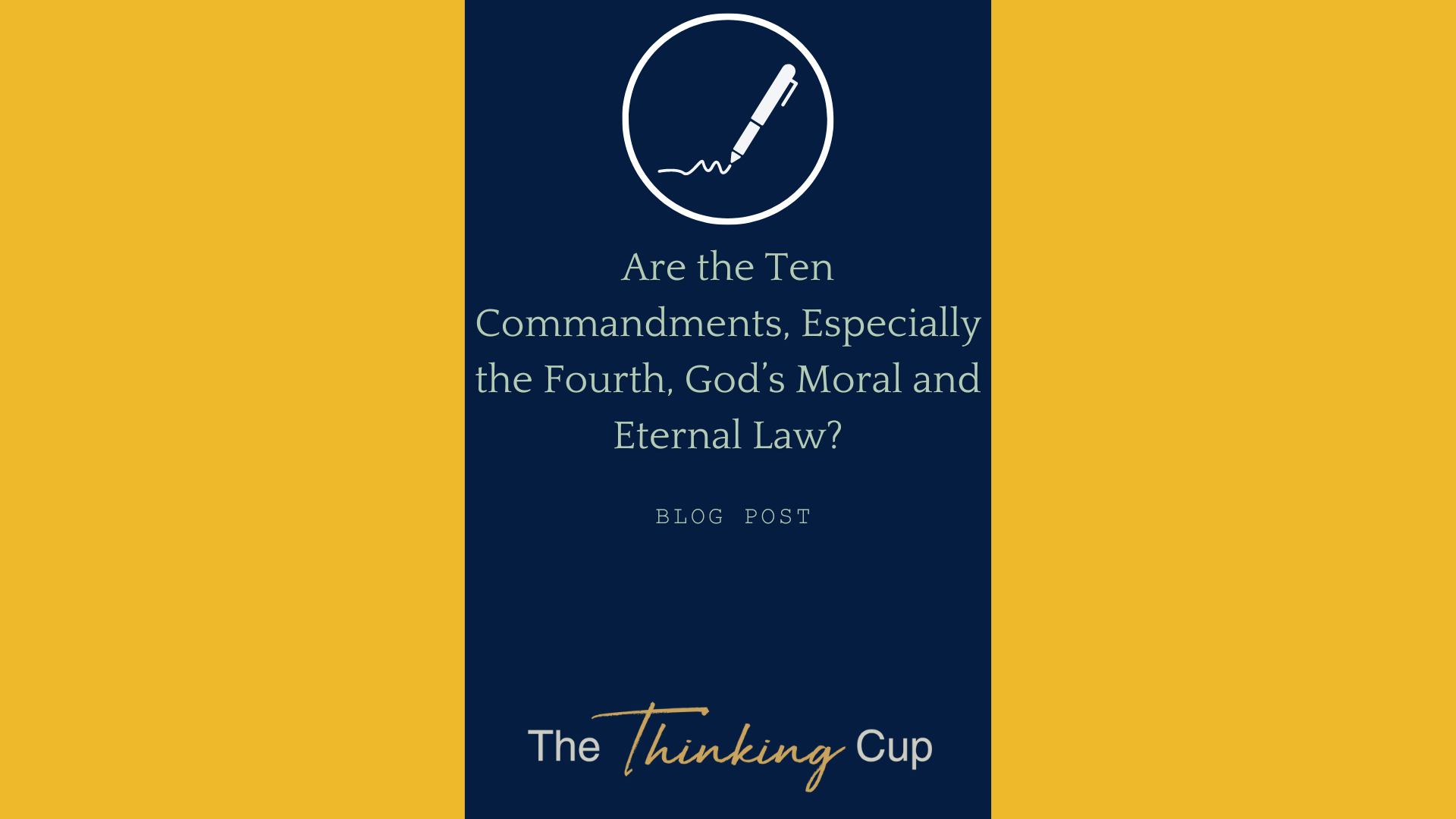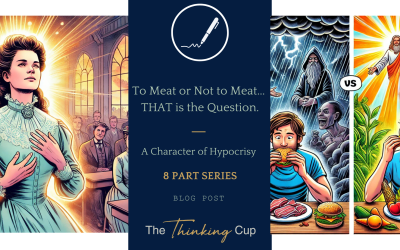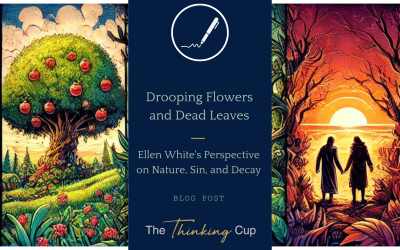As many of you know, I was born and raised a Seventh-day Adventist. I’ve always had a bit of rebel in me and I’ve always questioned things that others claimed to be de facto. In many of my conversations over the years, staunch Adventists have claimed that the Ten Commandments have existed for all eternity, existed before creation, are being followed in Heaven, and will continue to exist in the New Heavens and New Earth. This is a bold claim, but where do these claims exist in Scripture?
Before I go on, I want to be clear on something. My deepest desire for those who read on is that you question what I’m stating. Don’t take me for my word. Read the texts that I quote and research the topic for yourself. I truly desire to hold Scripture in high regard and encourage any alternative perspectives from the study and research I’ve done.
Now, back to the topic at hand….
There are NO Biblical texts that claim the Ten Commandments existed before creation. In fact, I don’t think they could have existed before creation because they were given to Israel at the Sinai Penisula (Exodus 19-20; Neh. 9:13-14; Gal 4:21-31; Heb. 12:18-21). We often forget that the first set of stone tablets given to Moses, which contained the Ten Words (The Ten Commandments), did not survive more than an entire day. The Law given on Sinai was literally broken within the first 24 hours of God writing it in stone for the nation of Israel.
“The Ten Commandments are not “moral” laws per se but laws that revealed Israel’s immorality and sinful nature and served to curtail it. The first four commandments are not naturally moralistic laws. They only take on moralistic overtones when one enters into a covenant relationship with Yahweh. Moralistic laws are inherent ought-nots. They are things ingrained in us by nature. They are the conscienceness of knowing what should and should not be done. The consciousness of knowing good and evil (Gen 3:22). The first four commands of the Ten Commandments are not inherent oughts in the human psyche and nature. No one knows inherently that they are not to have other gods than Yahweh. No one naturally knows not to make graven images and to not worship them. On the contrary, the majority of ancient civilizations, nations, and peoples actually made graven images and false gods that they worshipped. They did not naturally know that Yahweh is the only true God and that they should not make graven images.” [1]
The fourth commandment is of great importance to the Adventist, more than any other commandment. How is this exact 24-hour Sabbath keeping something that is built intuitively into a human being’s conscience? We don’t see any observance of the Sabbath before the giving of the Ten Commandments on Sinai. The author of the Torah doesn’t attempt to paint the Sabbath as an ingrained moralistic human law.
The Sabbath is not a moralistic law. When Yahweh was speaking to Moses about how the Israelites should interact with certain special days and festivals, notice what Yahweh said:
“The Lord spoke to Moses, saying, ‘Speak to the people of Israel and say to them, These are the appointed feasts of the Lord that you shall proclaim as holy convocations; they are my appointed feasts.’” (Le 23:1–2)
Scripture then talks about Sabbath, Passover, and other special Festivals as important holy convocations. Morality is not a festival to be kept, nor does morality hinge on a specific block of time, as described in Ex. 20:8-11; Lev. 23:32. Michael Morrison makes an interesting observation in his book Sabbath, Circumcision, and Tithing: Which Old Testament Laws Apply to Christians?:
“We find additional evidence that the Sabbath is a ritual law in that God himself does not keep the Sabbath. It is not part of his nature. He rested once, but a six-one cycle is not part of his eternal nature. Nor do we have any evidence that angels keep the Sabbath; it is not designed for them. This means that the Sabbath is not an inherent part of the way good creatures show love to God or to one another. The Sabbath is not eternal, for it did not exist before creation and will not be relevant in the new heavens and new earth. The Sabbath is not God’s nature, nor universal, nor timeless. It is a ritual law, saying that behavior that is good on Friday is not good on Saturday… Morality does not depend on the rotation of the earth, the day of the week, etc.” [2]
Unfortunately, many Adventists focus on the supposed eternality and morality of the Sabbath and the Ten Commandments. At the same time, they forget that the Sabbath was a unique ‘sign’ of the covenant between Yahweh and Israel.
“In contrast with the rest of the Ten Commandments, the Sabbath law alone was considered a sign for ancient Israel (Exod 31:12–17). Just as the rainbow was a sign of the Noachian covenant (Gen 9:13, 17) and circumcision was a sign of the Abrahamic covenant (Gen 17:11), so the Sabbath was the sign of the Mosaic covenant. The same expression, “between me and you” (Exod 31:13, 17), occurs as a formula in the covenants established with Noah (Gen 9:12) and Abraham (Gen 17:11). The Sabbath was a perpetual reminder of the covenant relationship God had established with His people on Mount Sinai. [3] It was a sign that the Lord revealed His day of holiness to Israel alone, and by observing this day it becomes a sign of Israel’s holiness. [4] As the Israelites shut down their normal work routine and worshipped God on the Sabbath, they demonstrated that they were keeping the covenant.” [5]
It is essential to understand that every covenantal relationship in the Old and New Testaments follows a specific formula. There is always a sign or ritual that is to be done for the constant reminder of the covenant bond between the two parties:
“After God led the people of Israel out of Egypt to Mount Sinai, He made a covenant there with them of which the Sabbath was the sign (Exod 31:16–17). When we come to the new covenant which Jesus ratified through the shedding of His blood, we see that the sign of this new covenant is the Lord’s Supper (Luke 22:20; 1 Cor 11:25).” [6]
“In fact, every promise of God given in Scripture was accompanied by a sign.[7] The sacrifices of Cain and Abel in Genesis 4 constituted a sign in salvation history. Similarly, God gave to Noah the sign of the rainbow and to Abraham the sign of circumcision.[8] Luther said that in the new covenant, God has given believers the signs of baptism and the Lord’s Supper.[9] 48 These signs serve to remind Christians that God “is with us, takes care of us, and is favorably inclined toward us.” [10] / [11]
Keeping the Sabbath as an eternal and moralistic law, while honorable and maybe out of love, means we want to remain in the ‘old covenantal relationship’ and not accept the ‘new covenantal relationship’ with God. This is the unfortunate reality of many Adventists’ relationship with God.
I would also like to point out what should be seemingly obvious: During the Israelites’ enslavement in Egypt, they could neither honor the Sabbath nor were they required to keep it holy. If this was a moral requirement, and as many Adventists like to connect, the Sabbath was supposedly instituted during creation, then why do we not see any observance before the giving of the Ten Commandments on Sinai? Furthermore, the Sabbath is given earlier outside of the Decalogue.
Mark Rooker rightly notices this in his book The Ten Commandments: Ethics for the Twenty-First Century:
“The Sabbath was not given to Israel for the first time at Mount Sinai. The special status of the day as well as its name were disclosed to Israel with the giving of the manna (Exod 16:22–23). God provided a day’s supply of manna for each of five days, but on the sixth day a double portion was given, so gathering would not have to be done on the Sabbath. In this episode the nation learned that the Sabbath belonged to the Lord and work was forbidden. Thus barely one month after the departure from Egypt and one month before the arrival at Mount Sinai, it was assumed that the Sabbath law was in force.” [12]
This helps us understand that the Sabbath was set as a memorial of creation and depends on the Creator. Sabbath isn’t a moral law, but rather a created memorial set aside to be sacred by the deity that created it, Yahweh. As Craigie stated:
“To rest on the sabbath day was to remember that man, as a part of God’s created order, was totally dependent on the Creator; man’s divinely appointed task to have dominion over the created order (Gen. 1:26) carried with it also the privilege of sharing in God’s rest. The Exodus, too, was a type of creation and thus forms an analogy to the creation account in Genesis. The Exodus from Egypt marks in effect the creation of God’s people as a nation, [13] and the memory of that event was also a reminder to the Israelites of their total dependence upon God. Whereas at one time the Israelites had been slaves in Egypt, with no appointed day of rest from their continual and monotonous labor, God’s deliverance made them potentially a nation, and the sabbath was to function as a day of rest in which the deliverance from the former bondage could be remembered with thanksgiving.” [14]
It is vital to understand that the Sabbath only has unique Biblical importance when enacted in a covenant relationship. This is why I stated earlier that the Ten Commandments, including the Sabbath Commandment, should be seen as ritual laws within the covenantal relationship unique to Yahweh and Israel. Before Israel was a nation, we do not see the Sabbath as a ‘sign’ of either the Adamic (Gen. 3:15) or Noahic (Gen 6:18; 9:9–10, 12–13, 15–17) Covenants. It isn’t until Yahweh enacts the Mosaic Covenant that Yahweh then stamps the Sabbath ritual as a memorial of the relationship the created has with its creator.
The Sabbath Commandment, as well as the entire Decalogue, is not the eternal moral law of God. As we have already stated, this would be impossible since the Sabbath was never observed by any human before the manna episode and the giving of the Law at Sinai. Some will try to conclude that Adam and Eve observed the Sabbath during the creation account. However, we must look at what the text allows versus what the Adventist Biblical Worldview imports into the text. Notice what Genesis 2:1-3 states:
“Thus the heavens and the earth were finished, and all the host of them. And on the seventh day God finished his work that he had done, and he rested on the seventh day from all his work that he had done. So God blessed the seventh day and made it holy, because on it God rested from all his work that he had done in creation.” (Ge 2:1–3)
The author of Genesis claims that God ‘finished his work’ and ‘he rested on the seventh day.’ Nowhere in the text does it state that humanity, through Adam and Eve, rested on the seventh day. In case we have forgotten, humans had already been created, and the author could have stated that they rested with God. But this just isn’t present in the text.
Adventists like to insert the idea that humanity rested with God on the ‘first’ Sabbath in the garden, but none of this is present in the text. The word Sabbath isn’t present. Humanity resting with God isn’t present. If one interprets the text as Adventists do, the only reason is to maintain the view of Ellen G. White and the early Adventist pioneers, as this isn’t in the original text. Below, we can see the personal view of Ellen White from a claim she made in the Review and Herald, written on May 30th, 1871:
“The object of the Sabbath was that all mankind might be benefited. Man was not made to fit the Sabbath; for the Sabbath was made after the creation of man, to meet his necessities. God rested, after he had made the world in six days. He sanctified and blessed the day upon which he rested from all his work which he had created and made. He set apart that special day for man to rest from his labor, and reflect, as he should look upon the earth beneath, and the heavens above, that God made all these in six days, and rested upon the seventh; and that his heart might be filled with love and reverence to his Maker, as he should behold the tangible proofs of his infinite wisdom.” [15]
The Bible does not claim that when God personally rested after his work with creation, the Sabbath was set apart for man to rest from his labor. This is a gross personal and unbiblical insertion into the text. We can see that Ellen White’s claims began to solidify as the years went by. She wrote this statement almost 14 years after the previous claim:
“…the seventh-day Sabbath, which at creation God sanctified and blessed for man.” [16]
But this shouldn’t surprise the reader. This is a common tactic of Adventist interpretation. Take an idea believed to be accurate, then make the text say it, or assume it as an infallible fact and move on like nothing is wrong. We can further see this overstep in other statements, where she boldly claims that the Sabbath was present at creation, even though the Sabbath is never in the text, only the seventh day. We don’t see it being set apart as holy for God’s people until the Manna in the wilderness and the giving of the Decalogue.
“God has given us his commandments, not only to be believed, but to be obeyed. The great Jehovah, when he had laid the foundations of the earth, and dressed the whole world in the garb of beauty, and filled it with things useful to man, when he had created all the wonders of the land and sea, instituted the Sabbath, and made it holy. God blessed and sanctified the seventh day, because he rested upon it from his wondrous work of creation.” [17]
As the years progressed, she would make bolder and bolder claims about her certainty about the Sabbath. But the truth from Scripture is clear; neither the Sabbath nor the commandments were laid out during the foundation of the earth. Scripture never states that God instituted the Sabbath during the creation week as something all humanity was to observe for all eternity. Again, remember, the text simply and clearly states that the seventh day was holy and blessed because God rested on it. Based on the biblical account, Adam and Eve did not ‘rest’ on this day. God rested on the seventh day; later, the Sabbath would memorialize creation (Exodus 20:8-11) and the exodus from Egypt (Deut 5:15).
In my next post, we will discuss whether the Ten Commandments are permanent and whether they were designed to serve as a moral barometer for all humanity.
[1] Lauriston, Hiding In Plain Sight.
[2] Morrison, Sabbath, Circumcision, and Tithing.
[3] See Hasel, “The Sabbath in the Pentateuch,” 34, 36. Ezekiel also mentions that the Sabbath was a sign for Israel (Ezek 20:12, 20).
[4] Tigay, “שָׁבַּת,” 508.
[5] Mark Rooker, The Ten Commandments: Ethics for the Twenty-First Century (Nashville, TN: B&H Academic, 2010), 91–92.
[6] David S. Hogg, “Carolingian Conflict: Two Monks on the Mass,” in The Lord’s Supper (Nashville, TN: B&H Academic, 2011), 149.
[7] Ibid., 35.91.
[8] Luther, Lectures on Genesis: Chapters 1–5, LW 1.248.
[9] However, Luther sometimes expanded the list of “signs” for the Christian beyond simply baptism and the Supper. See ibid., 249 (“Word, Baptism, and the Eucharist” are “dependable tokens of the sun of grace”); ibid., 250 (“Baptism, the Eucharist, and absolution” are “visible signs of grace”); id., Psalm 45, LW 12.262 (“Baptism, the Gospel, and the Eucharist” are “signs and pledges”); ibid., 266 (“Baptism, the Eucharist, the Gospel, Holy Scriptures, pastors, and the gifts of the Holy Spirit” are called “promises”); ibid., 269 (“Word, Baptism, and Eucharist” are “signs”); and id., Sermons on the Gospel of St. John: Chapters 1–4, LW 22.66 (“the ministry, Baptism, the Lord’s Supper, and absolution” are “agents, ordained by God to direct us to the Light”).
[10] Luther, Lectures on Genesis: Chapters 1–5, LW 1.309.
[11] Matthew R. Crawford, “On Faith, Signs, and Fruits: Martin Luther’s Theology of the Lord’s Supper,” in The Lord’s Supper (Nashville, TN: B&H Academic, 2011), 205–206.
[12] Mark Rooker, The Ten Commandments: Ethics for the Twenty-First Century (Nashville, TN: B&H Academic, 2010), 93.
[13] The Heb. of Exod. 15:16 (b), part of the song celebrating the Exodus, may be rendered: “till your people pass by, O Lord; till your people whom you have created (qaniṯa) pass by.”
[14] Peter C. Craigie, The Book of Deuteronomy, The New International Commentary on the Old Testament (Grand Rapids, MI: Wm. B. Eerdmans Publishing Co., 1976), 157.
[15] The Review and Herald, n.d., 213.
[16] The Review and Herald, n.d., 789.
[17] The Review and Herald, n.d., 829.




0 Comments